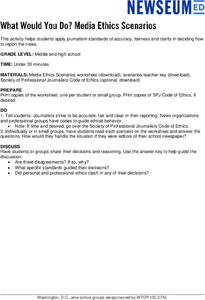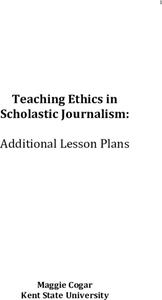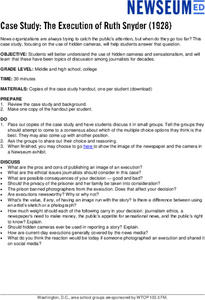Newseum
What Would You Do? Media Ethics Scenarios
Young journalists are presented with scenarios that involve media ethics. They must decide in each case whether to cover the story, what they would cover, and if covered, what the angle would be.
Curated OER
“Everyone Else Does It!” Ethics Project
Do you have good ethics? How about good morals? Scholars investigate the role business ethics, morals, and values play in society. Through role play, group work, and readings, they uncover the basis behind the importance of being...
American Psychological Association
Research Ethics
Psychologists designing experiments to research human behavior must consider weighty ethical concerns. Class members act as members of an institutional review board and examine proposals to determine whether included provisions...
Kent State University
Teaching Ethics in Scholastic Journalism
Events in recent years have underscored the importance of a free and independent press in a democracy. Young journalists engage in lessons about the function of journalism in a democratic society, practice the steps of Bok's Ethical...
Workforce Solutions
Workplace Ethics
An activity that focuses on workplace ethical dilemmas asks groups how to respond to a series of scenarios. First, the class brainstorms a list of ethics that apply to employers, then a second one that applies to employees. Using their...
Media Education Lab
The Ethics of Propaganda
What are the short and long-term consequences for consumers and producers of modern media propaganda? Class members ponder this essential question as their unit study of ethics of propaganda concludes. After examining two case studies,...
Newseum
Photo Ethics: Diversity
With the advent of photo manipulation software, it is possible to digitally edit a photograph in a way that is virtually undetectable. The question asked of young journalists in this lesson is whether such manipulation is ethical. Groups...
Newseum
Journalists Code of Ethics
Journalists are supposed to adhere to a Code of Ethics. To determine the degree to which reporters follow this code, individuals select three recent stories with photographs from newspapers, magazines, online news sites, or television...
Biz Kids
Understanding Business Ethics
After screening an episode by BizKids, scholars show what they know about business vocabulary, then take part in grand conversations about role models and ethical dilemmas.
Newseum
Photo Ethics: News Independence
Young journalists read a case study about an annual school tradition of a streaker running across the football field after the homecoming game. Small groups then decide whether or not to cover the story and whether or not to include a...
Newseum
Media Ethics: Fairness Formula Starts With Accuracy
As part of a study of media ethics, young journalists apply a fairness formula to news reports. They look at accuracy, balance, completeness, detachment, and ethics to determine if the reporting is fair.
Newseum
Photo Ethics: What Is Newsworthy?
Do not try this at home! At school! Or any other place! Groups of young journalists discuss the ethics of publishing photos of school peers performing dangerous stunts. They share their decision with the class and explain their reasoning.
Center for the Advancement of Ethics and Character
The Lion, the Witch, and the Wardrobe
C.S. Lewis' The Lion, the Witch and the Wardrobe is the anchor text for a three week unit that focuses on responsibilities, ethics, and virtues. While specific lesson plans are not included in this overview, a focus and discussion...
Good Project by Harvard Project Zero
The Good Project Lesson Plans
Excellence, ethics, and engagement are the three E's featured in a unit that promotes good work among elementary scholars. Through discussion, reflection, read-alouds, activity worksheets, and written responses, participants gain...
Children’s Hospital of Philadelphia
Vaccine History and Research
It all becomes a matter of timing. Groups use a variety of resources to research the history of vaccines by first creating a timeline of vaccine research using leading scientists' work. Learners read articles to develop a story of the...
Newseum
Case Study: The Execution of Ruth Snyder (1928)
The case of the 1928 execution of Ruth Snyder takes center stage in a lesson that asks young journalists to consider the ethics involved in publishing an image of an execution. A series of discussion questions ask individuals how they...
Newseum
When Tragedy Hits — Role-Playing a Breaking News Story
Young journalists engage in a role-playing exercise that asks them to consider the journalism and ethical issues raised by the coverage of the mass shootings at Virginia Tech on April 16, 2007. Pupils play the role of either a reporter...
Personal Genetics Education Project
Genetics and Reproduction
Disease prevention or designer babies? Use a set of slides to introduce the growing practice of preimplantation genetic diagnosis, or PGD. Teens read related articles and then break into groups to address different scenarios. Afterward,...
EngageNY
Grade 9 ELA Module 4, Unit 1, Lesson 10
What can consumers do to pressure companies to produce "ethically manufactured goods"? Readers examine the evidence Amy Odell uses in the supplemental text "How Your Addiction to Fast Fashion Kills" to support her argument and her...
US National Library of Medicine
Frankenstein: Penetrating the Secrets of Nature
Just because you can, should you? Reflections on the ethics and limits of medical research are prompted by a reading of excerpts of Mary Shelley’s Frankenstein, viewing of clips from the 1931 film, and examining sections of the online...
National Endowment for the Humanities
Albert Sabin and Bioethics: Testing at the Chillicothe Federal Reformatory
Do the ends justify the means? Getting a drug approved in the US is a long and involved process. But at some point out, it involves testing on humans. The ethics of such testing is the focus of a resource that uses Dr. Albert Sabin's...
College Board
Strategies for Teaching AP Computer Science
Implement strategies from the beginning to the end. A collection of strategies and lessons span from the first day of school to after the exam. Resources cover basic information such as computer ethics and top 10 tips to a lesson on how...
Personal Genetics Education Project
Genome Editing and CRISPR
Explore the excitement and ethical challenges of CRISPR and genetic-editing technology. Participants engage in do-nows, view a slideshow, and collaborate on scenarios about genetic editing. Group members analyze scenarios to generate...
Norton Life Lock
Digital Citizenship Jeopardy
Fake News & Clickbait, Privacy, Tech & the Internet, Cyberbullying, and Ethics & Netiquette are the categories in a Jeopardy game that tests the class's knowledge of Digital Citizenship.
Other popular searches
- Business Ethics
- Work Ethics
- Computer Ethics
- Medical Ethics
- Morals and Ethics
- Ecology Ethics
- Code of Ethics
- Values and Ethics
- Environmental Ethics
- Public Speaking Ethics
- Psychology Ethics
- Ethics and Science

























